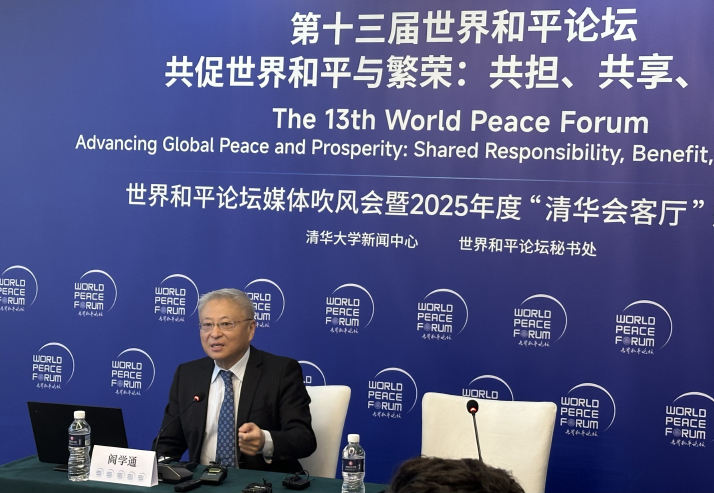| Voice |
| Order or Disorder? | |
|
|
 Yan Xuetong, Honorary Dean of the Institute of International Relations at Beijing-based Tsinghua University, speaks at a media briefing held in the lead-up to the 13th World Peace Forum in Beijing on June 26 (COURTESY PHOTO)
During a media briefing in the lead-up to the 13th World Peace Forum in Beijing on June 26, Yan Xuetong, Honorary Dean of the Institute of International Relations at Beijing-based Tsinghua University, delivered a lecture titled "Trump and the International Order." Analyzing flashpoints such as the Israel-Iran conflict, the Russia-Ukraine conflict and the Gaza crisis, Yan mapped the shifting international landscape and projected its potential futures. Yan argued that amid the trend of counter-globalization, global instability and uncertainty have all risen, and military conflicts are becoming more frequent. In economic terms, global industrial chains are undergoing restructuring, with long chains facing increasing risk of fragmentation, and new chains to become shorter, involving fewer countries. Yan has said on multiple occasions that the current global order is characterized by counter-globalization, a reversal of the post-Cold War globalization trend. Globalization involved marketization—joining the global market, and democratization—strengthening human rights norms. Counter-globalization undermines these principles through policies like decoupling—reducing international cooperation, and disregarding human rights norms, as seen in the Gaza humanitarian crisis. Yan pointed to comments U.S. President Donald Trump made on June 10, in which he opposed a military strike on Iran and voiced openness to restarting nuclear talks. This, Yan said, reflected Trump's reluctance to support Israel's escalation, because Trump's political base—the "Make America Great Again" movement—has long opposed drawn-out wars like those in Afghanistan and Iraq. They believe the U.S. should avoid sacrificing national interests for the sake of Israeli Prime Minister Benjamin Netanyahu. Between June 10 and June 21, the U.S. made a 180-degree policy shift, deciding on military action at the very last minute. Yan argued this type of decision-making creates massive uncertainty. "If the U.S. top leaders make decisions only when they feel they have no other choice, where is the predictability?" On the Russia-Ukraine conflict, Yan noted that while Trump once claimed he could end the conflict in 24 hours, he later came to understand that any ceasefire could only be negotiated by Russia and Ukraine themselves. The U.S., he said, lacks the power to unilaterally determine when or how the conflict ends. He also emphasized the rising risk of nuclear proliferation. Under the International Atomic Energy Agency framework, nuclear states are obliged to guarantee the security of monitored nuclear programs. However, the U.S. violated this responsibility by attacking Iranian nuclear sites. Such actions could erode trust in the global non-proliferation regime, according to Yan. On the economic front, he noted that the trade war with China launched during Trump's first term led to disruptions in several bilateral industrial chains. The Russia-Ukraine conflict, beginning in February 2022, triggered sanctions against Russia and led to broader supply chain breakdowns. The Israel-Iran conflict has now added another layer of disruption. According to Yan, supply chains rebuilt in the future will likely be shorter and more localized, with fewer countries involved. Many of today's still-intact long chains are at high risk of breaking. Yan emphasized that U.S. economic policy has undergone a fundamental shift in the context of counter-globalization. Since 2018, sanctions, especially tariffs, have become Washington's primary tool in managing international economic relations. This approach began under Trump, continued under Joe Biden, and is intensifying during Trump's second term, which has only just begun. Sanctions were once used selectively, but they are now the first step in U.S. interactions with other countries. Instead of beginning discussions with mutual benefit, the U.S. now starts by imposing penalties, then offers cooperation as a way to ease those penalties. In this framework, the logic of international cooperation has shifted from maximizing gains to minimizing losses. He concluded that Trump's administration no longer speaks of a "rules-based international order," but rather aims to build an order based on personal deals between decision-makers. "However, an international order based on personal deals," Yan said, "is bound to be uncertain." Copyedited by Elsbeth van Paridon Comments to liwenhan@cicgamericas.com |
|
||
|
||||||||||||||||||||||||||||
|